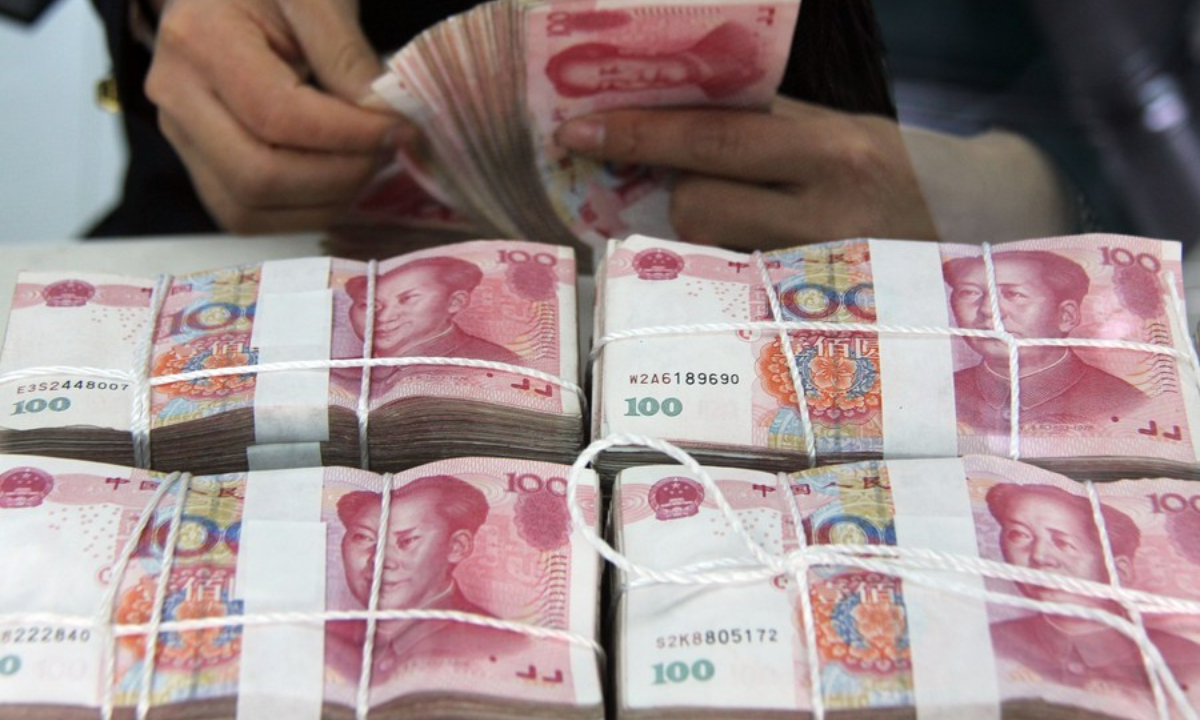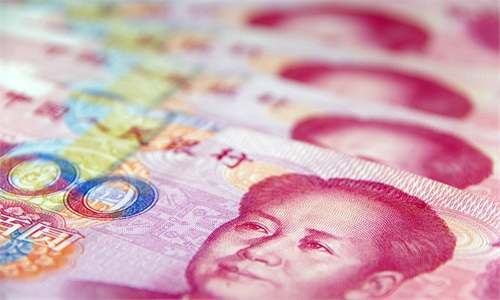China to keep ‘normal’ monetary policy, boost financial support for real economy: official
Report stresses ‘continuity, stability’ amid global woes

File photo shows a worker counts Chinese currency Renminbi banknotes at a bank in Tancheng County of Linyi City, east China's Shandong Province. Photo:Xinhua
China has the conditions and will maintain a "normal" monetary policy to ensure the Chinese yuan's stable value and increase financial support for the real economy, according to an official report on country's financial work submitted to the top legislature.It's another signal that China will emphasize stability in its financial policy, at a time when global financial markets are facing increasing turmoil under the US' radical monetary policy, experts said.
According to a report submitted by the State Council, China's cabinet, to the 37th Session of the Standing Committee of the 13th National People's Congress, China has the conditions to maintain a "normal monetary policy" for as long as possible and maintain the stability of the currency.
The report was delivered by Yi Gang, head of the People's Bank of China (PBC), China's central bank.
China will keep the growth of money supply and the scale of social financing at about the speed of nominal economic growth, unblock the transmission mechanism of monetary policy, and enhance the stability of credit growth to realize the comprehensive effects of finance in expanding investment, stimulating consumption and supporting employment, the report noted.
The nation will also continue to deepen the market-oriented reforms of interest rates to encourage financial institutions to reduce their actual loan interest rates, while enhancing the flexibility of the yuan's exchange rate to keep it at a reasonable and balanced level, it said.
Dong Shaopeng, a senior research fellow at the Chongyang Institute for Financial Studies at Renmin University of China, said that "normal" monetary policy means that it will be neither too loose nor too tight, which might cause the currency to deflate and fail to keep pace with the country's economic development.
According to Dong, growth in broad M2 money supply has been stable at about 8 percent in recent years, as authorities have taken factors such as moderate inflation and stable GDP growth into consideration. China has also strengthened the management of shadow banks and financial bubbles since 2015.
"China's real economy is the most stable in the world, which provides the fundamental basis for the currency's stability," Dong told the Global Times on Sunday.
China's move to maintain a stable monetary policy is in stark contrast to the "abnormal" monetary policies adopted by major central banks in the world, after the US Federal Reserve hiked interest rates at an above-normal speed to curb inflation, while the European Central Bank followed suit.
"In comparison, China's monetary policy has maintained continuity and stability, both avoiding flooding and achieving the objective of stabilizing the economy. It is of tremendous significance to stabilizing financial markets and keeping the offshore and onshore yuan stable," Chen Jia, an independent research fellow on international strategy, told the Global Times.
The yuan has undergone some fluctuation in recent weeks following the Fed's interest rate hikes. The offshore yuan broke the level of 7.35 per dollar recently, and it now stands at about 7.26 against the US dollar.
Chen also noted the flexibility of China's monetary policy. If the real economy and financial fundamentals undergo qualitative change, then it's necessary for China to improve and adjust its monetary policy accordingly, he said.
Officials also stressed that China will adhere to the policy of "finance serving the real economy" and increase the strength of financial support to the real economy to keep the economy operating within a reasonable range.
This will be done through multiple methods, such as encouraging lenders to expand credit supply at a reasonable pace and directing more capital into advanced manufacturing and strategic emerging industries.
There are still problems in financing for the real economy, such as a lack of financial tools, Dong noted.
"Financing channels emerging in recent years such as peer-to-peer lending and rural banks have also exposed many problems. Thus, it's important to optimize credit evaluations for small and medium-sized enterprises, so that they can get access to investment capital more easily and keep bad debt rates low," he said.
In the report, officials also stressed that China will keep on deepening financial reform and opening-up, including supporting qualified enterprises to seek listings overseas.
Chen said that promoting overseas listings is important for stabilizing the global financial market.
"At a time when US capital markets are going through volatility and the tech board is stuck in a liquidity crisis, stabilizing the prospects of Chinese stocks listed overseas is the biggest effort for stabilizing global financial and investment markets," he said.


